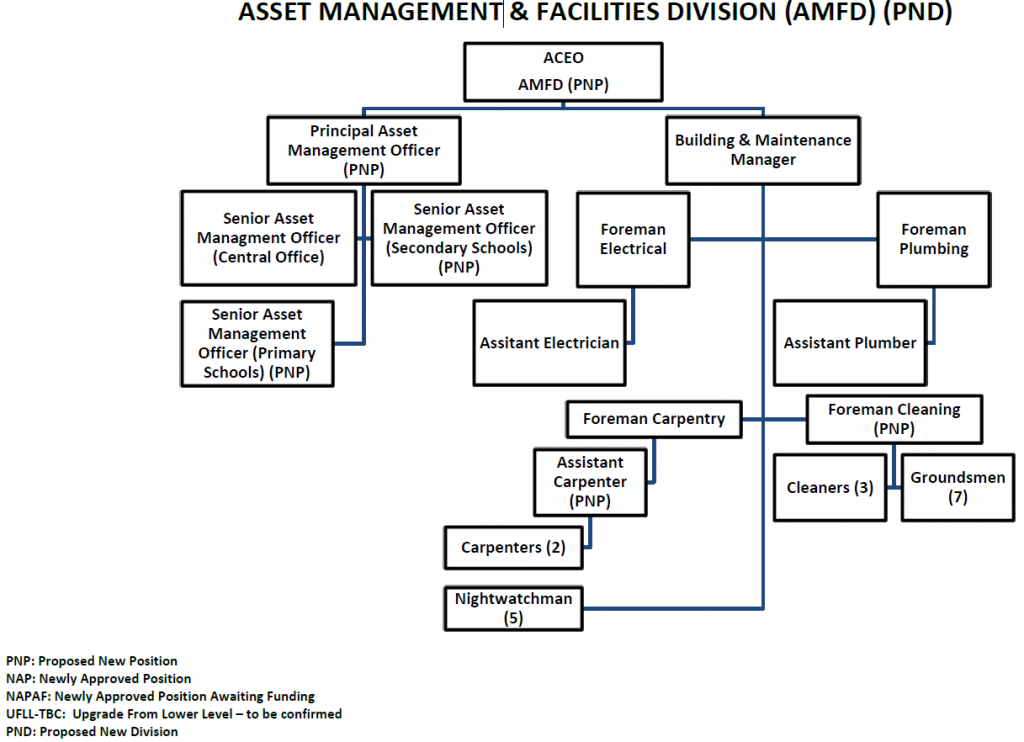Assessment & Examinations
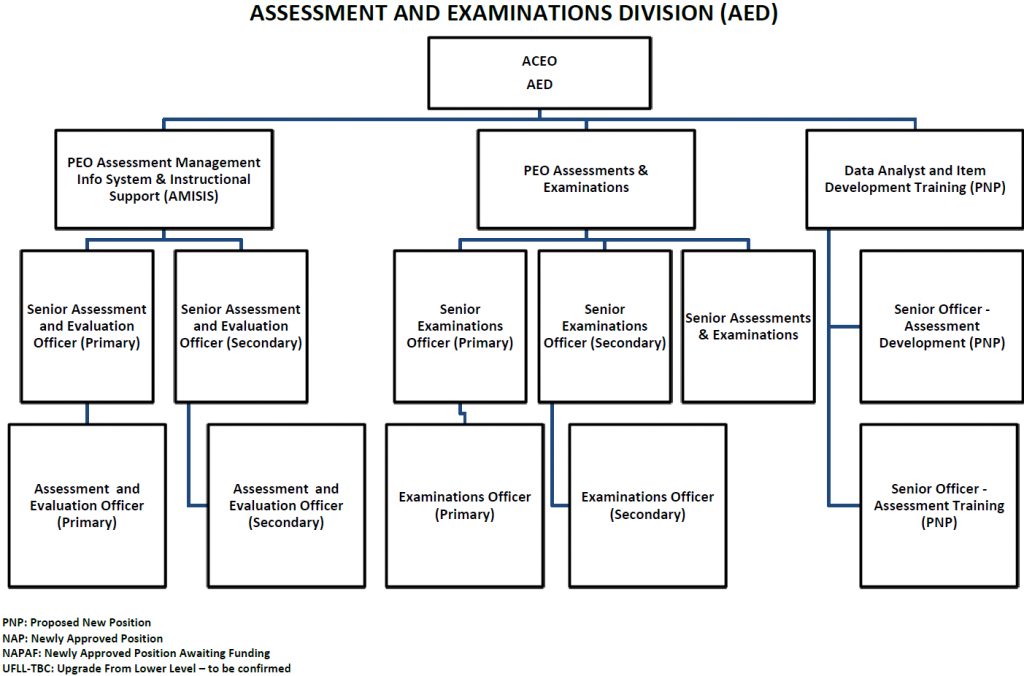
FUNCTIONS
- Implement a fully outcomes based assessment reporting system in accordance with national policies and objectives:
- Effectively manage the administration of all national assessments.
- Work with the National Assessment Council to conduct periodical reviews of the Samoa National Assessment Policy
- Ensure understanding and appropriate implementation of the National Assessment Policy in guiding schools-wide assessment plans from the drawing board to the classroom.
- Implement the recruitment of trained examiners, moderators, supervisors and examination markers (for senior national examinations)
- Liaise with TDAD to schedule and conduct training for Principals, SRO’s, examiners, markers and teachers on assessment to support teaching and learning
- Liaise with School Operations on the administration of SPELL tests, Year 8, Year 12 and Year 13 national examinations
- Co-ordinate the development and regular reviews of subject specifications and prescriptions
- Conduct analysis of national assessment results data and provide statistical reports in coordination with PPRD
- Develop and manage item bank system
- Conduct validity studies of assessment tools
- Conduct standardization of assessment items
- Monitor and evaluate all assessment programs and activities
Corporate Services
Co-ordinate budget planning, preparation, presentation and distribution:
- Liaison with Ministry of Finance, Public Service Commission and Public Accounts Committee on financial budgetary matters;
- Provide regular and accurate financial budget reports to Output Managers and Full Executive members on a timely manner;
- Provide financial advice on the trends and impacts of expenditure and revenue according to the approved budget;
- Monitor output expenditures to ensure compliance with budgetary recommendations; and to review financial transactions and codes for conformance to standard procedures and accounts, and
- Provide efficient and effective financial records management.
Manage financial transactions on behalf of the Ministry in an efficient and effective manner:
- Implement and monitor system controls of the Financing Reporting System (GoFAR – Finance One);
- Operate and monitor systems to control and record revenues and expenditures;
- Maintain accurate and up-to-date financial reports;
- Comply with the Acts and legislation of the GoS financial and budgeting reforms; and,
- Review and establish efficient work flow procedures for the Ministry
Ensure effective and efficient administration within the Ministry:
- Ensure compliance with up-to-date GoS requirements;
- Maintain a close liaison with PSC and Ministry of Finance on HR matters.
- Regularly monitor data entry procedures and maintain accurate payroll records and systems [GOFAR-People One and Pelican];
- Maintain, review and establish efficient work flow patterns;
- Monitor the implementation of MESC standard formats, templates, and procedures manuals;
- Maintain accurate and up-to-date payroll and administration records;
- Conduct mail delivery to all schools in Savaii and Upolu; and,
- Ensure effective allocation of transport services to all MESC divisions.
Manage MESC’s corporate personnel functions
- Co-ordinate recruitment, appointment, resignations, retirements and assessment of corporate and teaching staff;
- Identify training needs and budget, and schedule relevant training;
- Collate and facilitate the preparation of performance plans and succession planning;
- Monitor the recruitment and selection systems and processes and report monthly;
- Maintain accurate and up-to-date information for all corporate and teaching staff personnel files;
- Maintain and review the central registry filing system;
- Maintain accurate and up-to-date records of all correspondence for the Ministry;
- Conduct reviews of the MESC organizational structure to meet the government needs and reforms;
- Ensure the archives room is well maintained and kept clean at all times.
Manage MESC’s corporate personnel functions
-
- Co-ordinate recruitment, appointment, resignations, retirements and assessment of corporate and teaching staff;
- Identify training needs and budget, and schedule relevant training;
- Collate and facilitate the preparation of performance plans and succession planning;
- Monitor the recruitment and selection systems and processes and report monthly;
- Maintain accurate and up-to-date information for all corporate and teaching staff personnel files;
- Maintain and review the central registry filing system;
- Maintain accurate and up-to-date records of all correspondence for the Ministry;
- Conduct reviews of the MESC organizational structure to meet the government needs and reforms;
- Ensure the archives room is well maintained and kept clean at all times.
To ensure efficient and effective printing services for the Ministry and all schools.
- To print all educational support materials for the Ministry and all schools in a timely and efficient manner
- To print, compile and collate other reports as recommended by the Core Executive;
- Liaise with School Operations and the Curriculum, Materials and Assessment Division for printing requests;
- Maintain accurate records of printing requests;
- Conduct periodic maintenance work of all printing machines and coordinate servicing of the machines;
- Review and record the performance of the printing machinery; and,
- Conduct staff training on all printing machinery.
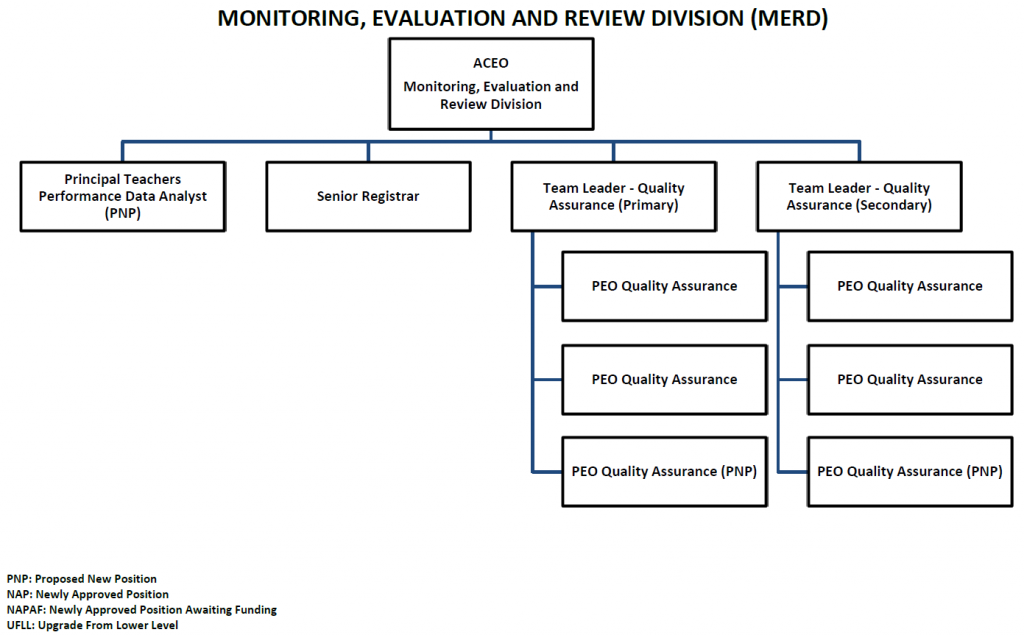
Culture
CULTURE AWARENESS
- Identify critical policy concerns on arts, culture and heritage for research and policy development.
- Coordinate new research and identify existing research data to support policy development.
- Develop, coordinate, monitor, review and evaluate the implementation of national culture, arts and heritage policies.
- Identify and define the cultural sector.
- Propose strategies to strengthen cross-sector collaboration and partnership.
- Preserve oral traditions by publishing the Samoa Ne’I Galo series and disseminate.
- Ensure the development of the National Culture Centre is complete to accommodate the safeguarding of Samoa’s tangible and intangible cultural heritage
- Propose regional and international cultural, art festivals and events for Samoa to attend and coordinate representation.
- Propose relevant international conventions and agreements Samoa can ratify and be signatory to.
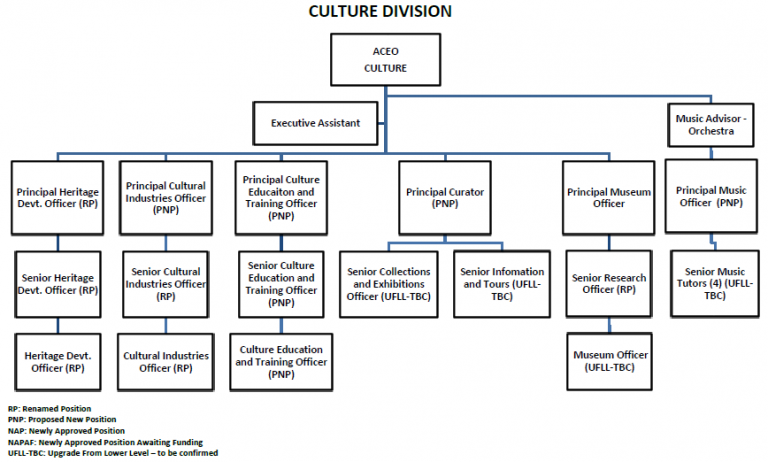
MUSEUM OF SAMOA
- Act as a repository of knowledge about the Samoan material and intangible culture, and its environment
- Serves to interpret, preserve and promote the material and intangible culture of Samoa and those of its neighboring island nations
- Promotes the importance of preservation and conservation of the natural environment of Samoa to and for its people
- Establishes the importance of spreading knowledge about Samoa’s material and intangible culture through school curriculum, cultural tourism, and advocacy.
- Alerts people to issues relating to Samoa’s cultural heritage such as monuments in peril, fading skills of sailing, handicrafts, afa netting etc
- Serves to expand and acts as a source of such knowledge by means of research i.e working with relevant universities, related organizations, members of the general public and/or hosting seminars, etc.
- Collaborates with other museums worldwide and other regional and international organizations to further enhance its purposes and objectives set to benefit Samoa and its developments
NATIONAL ORCHESTRA
- Undertake variety of performances
- Promote music education in schools
- Promote career opportunities
- Promote Samoa’s music industry
- Develop composition and arrangement of Samoan musical identity
Curriculum Design & Materials
FUNCTIONS
- Ensure the development of curriculum for all levels of schooling that is consistent with national objectives:
- Develop the National Curriculum Policy Framework for approval by the National Curriculum Council
- Work with the NCC to ensure regular reviews of the National Curriculum Policy Framework and curriculum statements
- Provide executive support to the NCC
- Manage the development and review of curriculum statements for all subject areas
- Provide ongoing support for teachers for effective implementation of the National Curriculum Policy Framework and curriculum statements through network meetings and monitoring visits
- Provide detailed reports of visits, network meetings and training highlighting issues and recommendations for the MESC CORE Executive
- Liaise with PEO Teacher Development to schedule and conduct training for Principals, SRO’s and teachers on the use of the National Curriculum Policy Framework and curriculum statements
- Implement and monitor progress of the Inclusive Education Policy
- Work with the National ECE Council to monitor ECE schools and provide training on curriculum and assessment for ECE teachers
- Ensure the provision of materials to support the teaching of the curriculum:
- Manage the development of curriculum support materials including multimedia resources efficiently and according to the agreed development schedule and Materials Production Plan
- Establish and maintain subject committees
- Conduct regular reviews of support materials to ensure consistency with the curriculum statements and according to the procedures specified in the Review and Evaluation Plan
- Liaise with PEO Teacher Development to schedule and conduct in-service training for Principals, SI’s and teachers on effective use of support materials and equipment
- Conduct monitoring visits to ensure effective implementation of support materials and equipment
- Develop intervention strategies for systems wide improvement targeting Literacy, Numeracy and Science (SSILNas, Home School Partnership).
- Develop national tools for assessment at primary level
- Assist in the moderation of Internal Assessment for SSC and SSLC
- Conduct training at National and Cluster Levels on curriculum and classroom based assessment in collaboration with TDAD.

Education Sector

FUNCTIONS
- Coordinate the development of sector Implementing agency (IA) work plans and budgets to meet expected time frames, alignment with ESP and DP requirements
- Meet sector reporting requirements for:
- achievement of sector KPI
- implementation and impact of planned IA activities
- sector expenditure
- support provided by Development Partners
- sector governance
- financial and risk management (including procurement and audit reports)
- Ensure that the AMPs are in line with Education Sector Plan
- Maintain a sector monitoring and evaluation framework to measure progress towards achievement of sector KPI
- Monitor sector finances to update the Medium Term Expenditure Framework annually
- Facilitate communication and liaison within the sector and with stakeholders
- Monitor the performance assessment frameworks to meet requirements of Development Partners agreements
- Manage, coordinate and provide the linking mechanisms between participating ministerial entities and sector partners involved in the Education Sector
- Improve and harmonize the effectiveness of donor aid and education systems performance
- Provide secretariat functions to the Education Sector Advisory Committee and the Education Sector Working Group
- Implement activities to improve the sector coordination of cross cutting issues, policy development, data management and new initiatives
ICT & Media
FUNCTIONS
Ensure efficient and effective ICT services:
-
ICT UNIT
- Conduct, review and research ways to use ICT effectively as a tool for information dissemination;
- Develop strategies to assist users to assessing information and communications technology for the Ministry;
- Develop and present to Management policies for the use and procurement of ICT equipment
- Coordinate plans and training for the use of ICT as a teaching and learning tool;
- Develop an ICT Strategic Plan for the development of knowledge and understanding of ICT for the Ministry and school;
- Set up Central Office as the hub for information management and dissemination through ICT;
- Work collaboratively with the School Operations Division and CMAD in the management of ICT;
- Oversee the security of ICT equipment at all times and especially in times of emergencies;
- Manage the security of information through technology;
- Prioritize and reallocate ICT equipment and machines according to needs;
- Provide relevant documentation to support the procurement of new machines;
- Identify staff and teacher needs;
- Conduct training and record level of trainings offered;
- Monitor and review ICT activities
COMMUNICATION UNIT:
- Produce radio, television programs, press releases, newspaper inserts and SEUGA Newsletter
- Spokesperson for the Ministry on Education and Culture issues
- Implement the MESC Communication Strategy
- Represent the MESC on official and community committee
AUDIO VISUAL UNIT:
- Provide audio visual recordings for the safeguarding of oral traditions, arts and crafts
- Production of advertisement materials for the promotion of MESC
- Preserve records of cultural heritage
- Promote cultural and educational programmes for public information
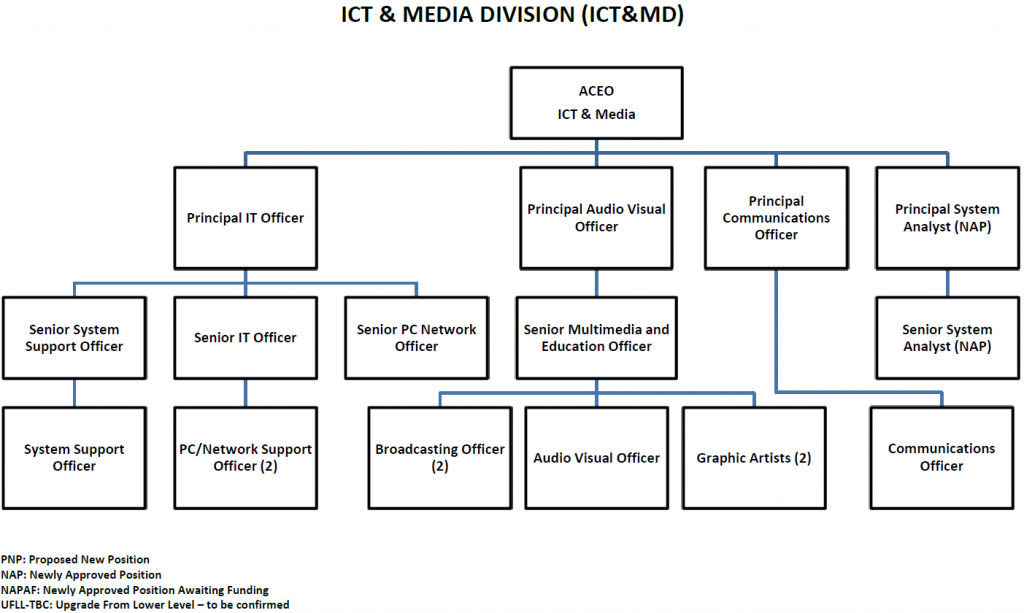
Monitoring, Evaluation & Review

FUNCTIONS
- Implement and support the on-going development of the Professional Standards for all government teachers (primary and secondary)
- Monitor, Review and Evaluate Teachers Performance using the Professional Teacher Standards
- Evaluate the effectiveness of the Quality Assurance Performance Appraisal System for monitoring teacher performance.
- Review the Professional Standards for Samoa’s Teachers to inform policy recommendations, changes and interventions to improve teacher quality.
- Evaluate teacher performances to support Professional Development Training initiatives.
- Conduct awareness amongst teachers, stakeholders and communities of the expectations of the Professional Teacher Standards
PRINCIPALS (CONTRACTED & NON-CONTRACTED)
- Conduct Quality Assurance Performance Appraisal for both contracted and non-contracted Principals
TEACHER REGISTRATION
-
- Conduct Quality Assurance Performance Appraisal to support registration of teachers both secondary and primary
National Archives and Records Authority
FUNCTIONS
ARCHIVES UNIT
- Develop, promote efficient and effective methods, procedures and systems for the creation, management, storage, disposal, preservation and use of Public Records.
- Provide storage, preservation, management and conditions for access to Records of permanent value in the
- Authority’s possession according to the provisions of the Act
- Conduct research and provide advice in relation to the management and preservation of Records of Samoa that may have archival value, whether such records are public or private.
- Seek to obtain custody and management of resources or material not in the custody of a Public Body and which in the opinion of the Authority, forms part of the archival resources and ought to be in the custody of the Authority.
PUBLIC LIBRARY SERVICES
-
- Provide public library services to schools and community
- Provide all required library materials, text books and references for schools and community
- Investigate and research enhancement to the libraries for better delivery of services
- Conduct staff training on library skills
- Oversee the repairs and maintenance requirements for libraries
- Develop a system for the archival of outdated library materials, text books and references
- Maintain and review library computerize catalogue system
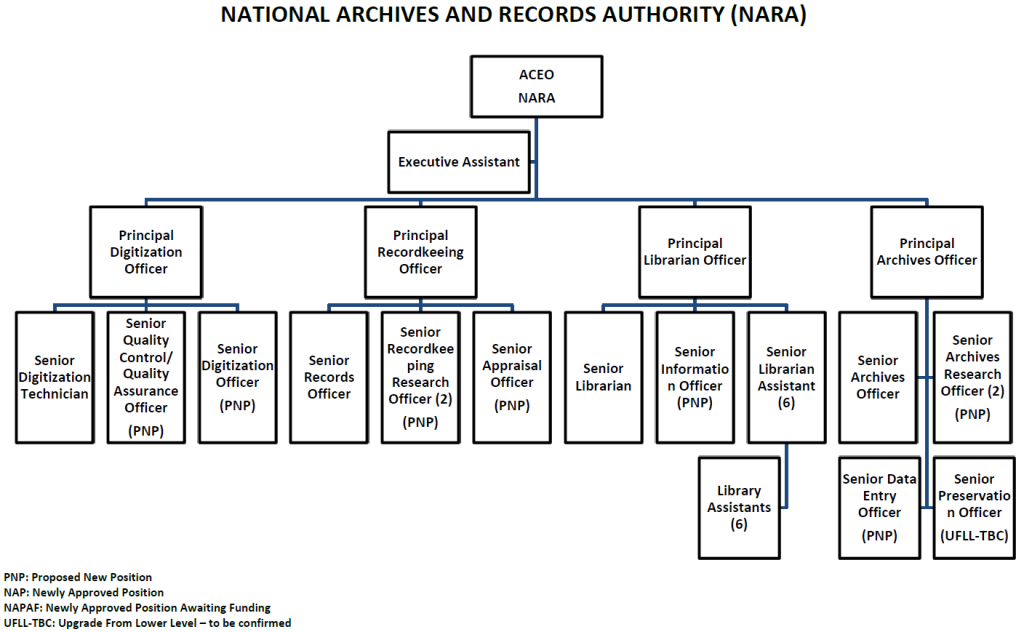
Policy, Planning & Research
CORPORATE PLANNING UNIT
Manage and ensure timeliness of:
- the corporate planning cycle as stipulated by the central agencies;
- the development of annual management plans for all divisions;
- quarterly reviews of the MESC annual management plans;
Manage and ensure the implementation of all MESC plans through:
- constant monitoring and reviews;
- regular meetings of the corporate planning committee(CPC);
Ensure all plans are interlinked
Ensure that the MESC annual reports are produced and tabled in parliament.
Produce the annual school term calendar

POLICY ANALYSIS UNIT
- Conduct policy development and analysis;
- Manage the conduct of policy development through the establishment of working parties;
- Provision of guidance and mentoring for policy content divisions;
- Presentation of policy papers for management decision;
- Distribution of final approved policies;
- Prepare cabinet submissions for policy endorsement
- Assist in the development of the MESC annual reports
INFORMATION ANALYSIS UNIT
- Manage the collection, collation, analysis, and presentation of data to management and educational stakeholders;
- Provide data support to strategic planning and management decision making;
- Produce and present analytical reports to inform research and policy development;
- Provide data to ensure proper allocation of resources to schools;
- Conduct the annual school census;
- Develop and produce the MESC annual statistical digest;
- Update the Student Education Number (SEN) register and make amendments to the examination lists;
- Provide data for efficient planning and utilization of resources and effective performance monitoring;
- Assist with the development of the MESC annual reports
- Collect enrolment data for ECE centers and special schools for allocation of the government grant
PROJECT COORDINATION AND RESEARCH UNIT
- Manage the monitoring and reporting processes of all MESC projects to MESC Management and CDC;
- Present Project Briefs for decision of Management as required;
- Provide summaries of progress and emerging issues related to project implementation;
- Evaluate impact of projects in contributing to MESC Goals and Objectives;
- Monitor the implementation of all MESC projects/programmes and submit quarterly reports to Management;
- Update the MESC Projects Management Database;
- Lead and manage the conduct of research according to the MESC research guidelines and ethics;
- Identify and recommend key research issues to management;
- Conduct research according to prioritized issues from management and research areas in the Education Sector Research Strategy
- Review MESC Research Guidelines based on education reforms
Samoan Language Commission
FUNCTIONS
- Initiate, develop, coordinate, review and advise upon and assist in implementation of policies, procedures, measures and practices designed to give effect to the declaration in section 5 of the Samoan Language Act as an official language of Samoa.
- Generally to promote the Samoan language, and in particular, its use as a living language and as an ordinary means of communication.
- Develop a strategic plan and a corporate plan for the commission.
- Monitor and advise the implementation of its policies and corporate plan.
- Consider and report to the Minister upon any matter relating to the Samoan language that the Minister may refer to the Commission for its advice.
- Advise the government and the Parliament on Samoan language matters through the Minister.
- Carry out consultation on policy development, publicize policies and decisions on the Samoan Language.
- Monitor development or changes in the Samoan Language
- Provide the interpretation and translation service
- Carry out other functions conferred on it under this Act or any other Act.
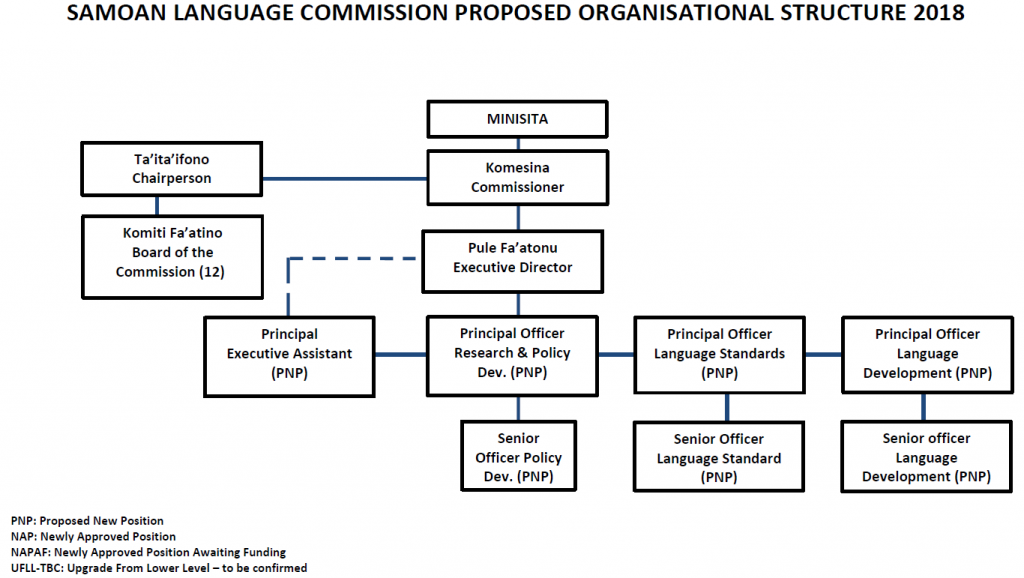
School Operations
FUNCTIONS
The overall function of School operations is to assure quality of education through the continuing development of student performance, teacher management (Posting) and overall enhanced school improvement and performance:
- Manages and implements the Minimum Service Standards (MSS) in schools with a focus on school environment, hygiene and safety; school partnership, governance and management; teacher quality; student achievement and classroom assessment.
- Manages school improvement processes through continuous assessment and development of School Improvement Plans and School Annual Management Plans.
- Regulates and monitors school registration, governance and management requirements as stipulated in the Education Act 2009 (or its amended version), School Governance Framework and policies and the School Organisational Manual;
- Monitors compliance of schools with the Compulsory Education Provision in the Education Act 2009 (or its amended version) and other relevant legislations;
- Leads and manage all teaching personnel and ensure staffing requirements are addressed efficiently and effectively in compliance with prevailing MESC legislations and policies;
- Manages School Staffing and School Personnel to ensure compliance with established policies.
- The following sets out each of the key responsibilities of each of the Units
1. School Performance & Improvement Units (Savaii, Manono & Upolu)
The SPI Units responsibilities are:
a) School Performance:
- Develop and maintain a School Performance database.
- Monitoring of schools’ Annual Reports on their Annual Plans and School Improvement Plans.
- Develop criteria and benchmarks for performance that will enable school management

2. School Personnel & Staffing Unit (SPSU)
The SPS Unit is responsible for:
a) School Personnel:
- Ensure Performance Plans for PORs are aligned with their respective schools School Improvement Plans and School Annual Plans
- Ensure timely submission of all Performance Plans for PORs to PSC.
- Ensure timely preparation and submission of all Performance Review reports for PORs to CMM and PSC.
- Ensure timely submission to PSC of extension requests.
- Liaise with School Inspectors on complaints and investigations regarding teaching personnel
- Manage the counseling and discipline of teaching personnel.
- Coordinate with the Media Unit to design and prepare promotional materials advertising the teaching profession
- Collaborate with Teacher Development Division to ensure that all new appointees receive appropriate induction training
b) School Staffing:
- Work closely with School Inspectors, School Principals and School Committees to ensure school staffing needs are managed adequately
- Identify staffing needs according to policies on staffing ratios outline in the MESC Staffing Manual
- Prepare requests for donor funded/volunteer staff on an as need basis and ensure schools have exit plans for volunteers
- Prepare and submit Staffing Verification visits Work-Plan to ACEO SOD for endorsement
- Prepare and submit Staffing Monitoring Visit reports
- Coordinate Posting Committee meetings
3. School Inspectors (SI)
The School Inspectors (School Support Advisors) responsibilities are to:
- Monitor regularly the collection and efficient communication of school data as required by various ministry divisions;
- Monitor, evaluate, review, and report the compliance of each assigned school with the MSS on a regular basis;
- Identify areas of non-compliance of each school and provide strategic advice for school improvement in the identified areas;
- Monitor, review and report monthly on the progress of cluster schools against their respective School Improvement and School Management Plans;
- Foster closer professional collaborations between cluster schools for professional development and professional learning opportunities;
- Strategically advise cluster school principals to execute their leadership roles more effectively and inclusively in close collaboration with the School Committees, PTA and wider community.
- Assist with the management of school resources efficiently in accordance with Ministry mandates, policy and processes, in order to foster quality assurance and ethical standards of all services;
- Provide advice to SOD of the cluster schools’ performance and development work and progress through verbal and written reports.
- Liaise with School Inspectors to identify either school specific or system wide training needs and liaise with the PEO Teacher Development (TDAD) to design and provide that training.
Teacher Development and Advisory
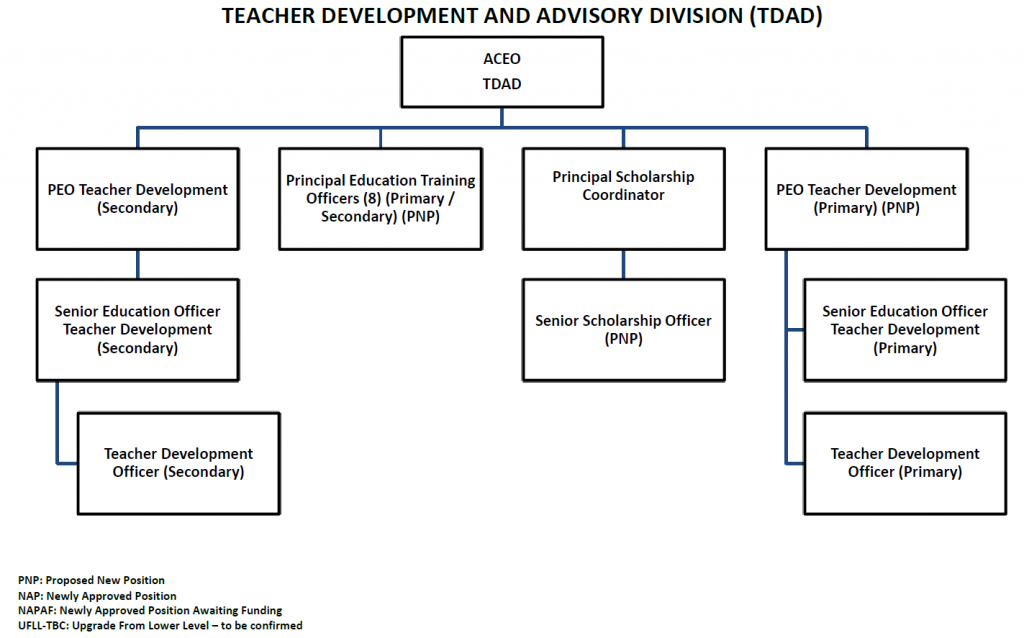
FUNCTIONS
- Coordinate, facilitate and collaborate with relevant stakeholders and trainers to ensure the effective implementation of a comprehensive professional development training program for teachers
- Provide professional support to all teachers at the national, cluster and school level to ensure quality teaching and learning programs are being implemented
- Provide professional management and leadership support to School Principals and teachers to ensure overall school improvement and an enhanced quality education
- Explore funding alternatives for different qualification streams
- Liaise with SQA to ensure training programs provided for teachers fall within recognition of prior learning and work together to accredit training programs
- Develop and implement capability plans for the teaching professionals to ensure continuous development programs are in place to strengthen quality teaching services
- Facilitate and coordinate awareness programs primary and secondary schools to promote scholarship opportunities in the teaching profession
- Develop and strengthen teacher marketing programs to retain and recruit teachers in the teaching profession
- Provide targeted professional development programs for teachers not meeting Teacher Registered Standards
- Coordinate local and international teacher upgrade programs to ensure all teachers have a Degree in Education or a relevant field
- Coordinate local and international scholarships for teaching for both pre-service and in-service teachers
Asset Management & Facilities
FUNCTIONS
- Ensure accurate recording of assets of the Ministry and schools on the GoS Asset Management System;
- Ensure accurate recording of asset movement;
- Develop mechanisms to safeguard all assets in the Ministry and schools;
- Ensure effective, efficient use of existing assets
- Ensure write-off assets process is consistent with the GoS Asset Management System;
- Ensuring effective controls are communicated through clear documentations;
- Ensure procurement of assets are consistent with policy, and with relevant legislations and procedures;
- Ensure all school buildings and Ministry’s facilities are insured;
- Develop annual maintenance plans for Ministry’s facilities;
- Ensure the grounds, facilities and physical environment of the Ministry and Libraries are maintained according to schedules.
